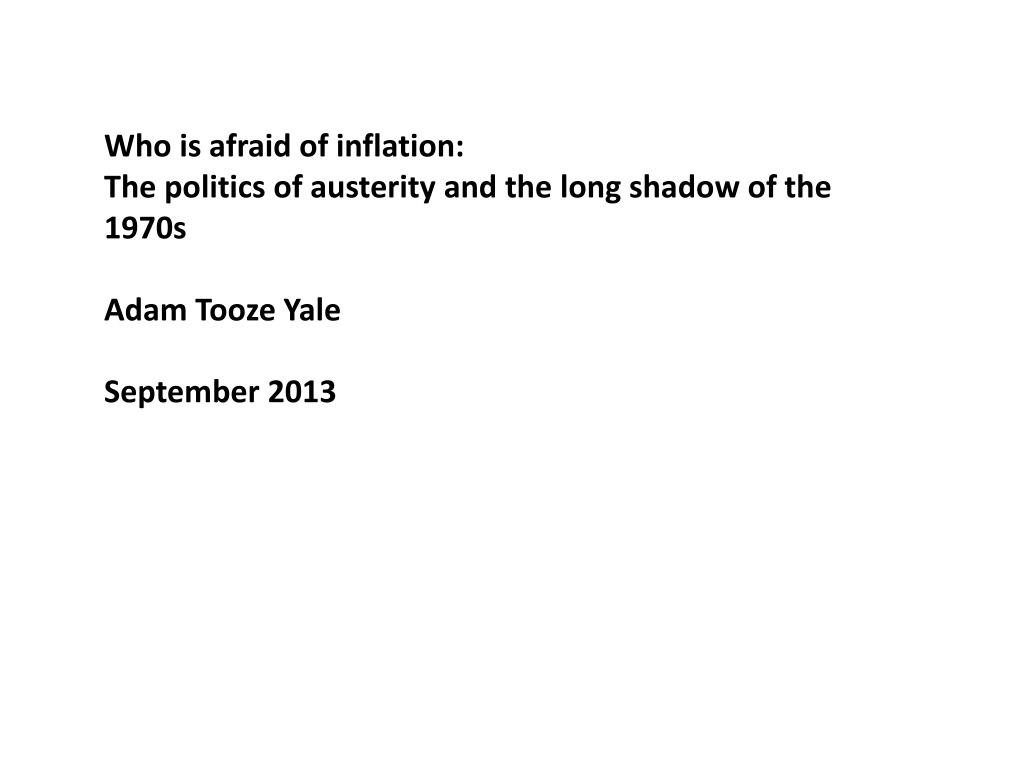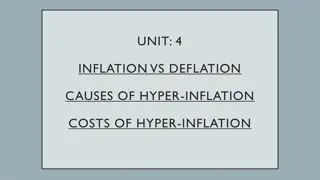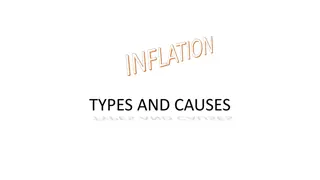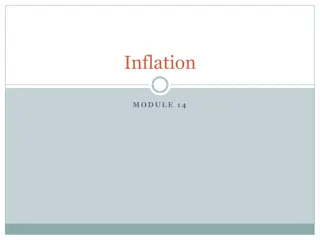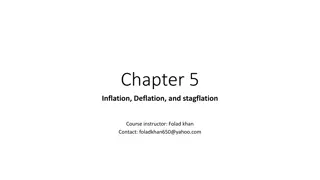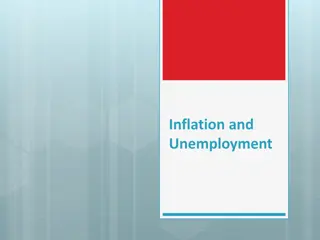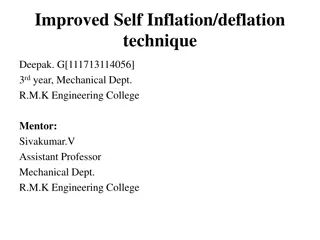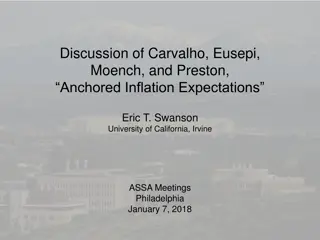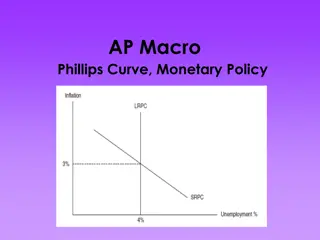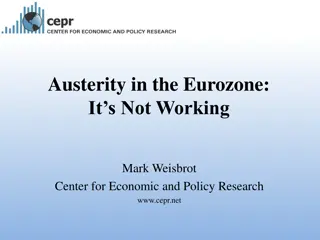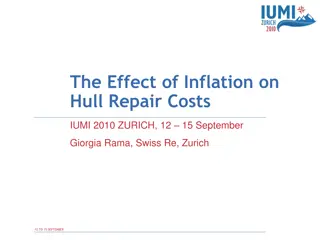The Politics of Austerity and Inflation Fear in the Shadow of the 1970s
Explore the dynamics of anti-inflationism, the crisis paradigm, and the tension between inflation and unemployment through the works of Adam Tooze, Helmut Schmidt, and Wolfgang Streeck. Delve into historical perspectives, alternative future scenarios, and the implications for global capitalism in a thought-provoking discussion.
Download Presentation

Please find below an Image/Link to download the presentation.
The content on the website is provided AS IS for your information and personal use only. It may not be sold, licensed, or shared on other websites without obtaining consent from the author. Download presentation by click this link. If you encounter any issues during the download, it is possible that the publisher has removed the file from their server.
E N D
Presentation Transcript
Who is afraid of inflation: The politics of austerity and the long shadow of the 1970s Adam Tooze Yale September 2013
Helmut Schmidt, Dortmund, Juli 1972: lieber 5 prozent inflation als 5 prozent arbeitslosigkeit rather 5 percent inflation than 5 % unemployment
Agenda for the talk: 1. Critique of left anti-inflationism, anti-Streeck 2. A useable history of the 1970s 3. Alternative future histories of the recovery: austerity, managed inflation, inflationary conflict
Wolfgang Streeck, Buying Time. The Crisis of Capitalism Postponed
Streeckscrisis sequence paradigm is based on the US: Inflation, public debt, privatized Keynesianism
Streeck wants to see this as a generic, common pattern, repeated in each major national economy. Whereas in fact what we need is an account of the build-up of macroeconomic imbalances as expression of uneven and combined development of global capitalism
If some are buying time, who is selling?
Tensions in Streecks work Describes EURO as a reborn gold standard rather than a fiat currency zone with a willfully conservative policy stance In favor of devaluation but against inflation In favor of debt jubilees but against inflations but against inflationary disorder In favor of organized labor but against the political disorder unleashed by inflation In favor of protest Unwilling to countenance a return to the 1970s but keen to draw inspiration from Bretton Woods
Streeck, Gekaufte Zeit, 224. Streeck on the need for the right of the citizenry to panic like the financial markets
Helmut Schmidt, Dortmund, Juli 1972: lieber 5 prozent inflation als 5 prozent arbeitslosigkeit
What makes Schmidts 1972 speech possible? 1. Audience organized working-class that had put the SPD in office 2. Collapse of Bretton Woods 3. Belief that there was a trade off 4. Belief that as finance Minister he had power to make the call rather than Bundesbank
Just over ten years later 1. Trade off has collapsed from Philips curve to NAIRU (non-accelerating rate of unemployment 2. Schmidt out of power and old left fragmenting irrevocably 3. Bundesbank calling shots both at home 4. Bretton Woods replaced by european monetary system
A new German Sonderweg defined during the great inflation: 1973-1983
But this special path is, at first, not exemplary. It puts Germany on the defensive. Contrary to simplistic narrative of market revolution in economics, Keynesianism does not give up without a fight!
The caricature of mechanical Keynesianism Bill Phillips LSE, 1949 Money National Income Analogue Computer MNIAC
1970s High-Tech the Econometric Matrix of the locomotive theory: interdependencies estimated as part of the OECD/UN LINK model, 1978
Decisive Junctures in the Establishment of the Anti-Inflationary Order March 1978 June 1978 30 Nov 1978 Oct 1979 Dec 1980 Feb 1981 19 Feb 1981 1 April 1981 11 Mai 1981 22 Mai 1981 5 Oct 1981 Juni 1982 12 Juni 1982 March 1983 Preliminary Franco-German-Commission talks about EMS Bonn Summit Schmidt compromise with the Bundesbank over EMS Carter appoints Volcker to Fed $ Reserves of Bundesbank fallen by half since 1978 $ interest rates reach maximum of 21 % Bundesbank responds by raising rates German and French governments negotiate with Saudis Mitterand elected French President Capital Controls introduced in France 1st devaluation of Franc in EMS Fiasco of Paris Economic Summit 2nd Franc devaluation Collapse of socialist-communist coalition in Paris
1978-1983 as a historic juncture 1. Direction of Fed policy set down to the present 2. Schmidt s compromise with the Bundesbank sets tone of Eurozone the largest economic unit in the world: Iron triangle of geopolitical concern, coming to terms with the past and monetary/fiscal austerity 3. France is the last experiment by a major capitalist economy. It is french officials who generalize what becomes known as Washington consensus
By revisiting the history of the 1970s and recasting it as a story of dramatic political struggle and open debate we may hope to puncture the complacent determinism of the great moderation story. Can we counteract the tendency for TINA to morph into TWNA (There was no alternative)
In the golden age, growth and inflation had been positively associated.
If moderate inflation is not bad for growth, what might it be good for? Total Liabilities in Relation to GDP: USA and FRG
Slaying the inflationary demons for good? An austere future of debt repayment without historical precedent.
Rewriting the first ten of the trente glorieuse: the effect of inflation in reducing real postwar debts 1945-1955
Can we have an inflationary policy? 1. Is it equivalent to pushing on a string ? i.e. can we get investment to revive? Is a policy of austerity more or less likely to revive animal spirits? 2. Can we manage an inflation once it is going?
If the central bankers do manage an upward revision in inflationary targets and stick to them . It will be the greatest technocratic success story in history
We will need to reevaluate the pessimistic stories of policy failure told since the 1970s. We will need to reevaluate the story evoked by the shattering of the Philips Curve
But what if the 1970s repeat themselves and inflation proves hard to control . Inflationary momentum may build up. But what will be the social forces that drive the escalating inflation? Unemployment is selective. The Cost of Living Is Felt by Everyone.
To Streecks Adorno Lectures let us reply with a paraphrase of Horkheimer s famous injunction about capitalism and fascism: Whoever wishes not to speak of inflation . . should be silent about debt jubilees and a new politics of redistribution
